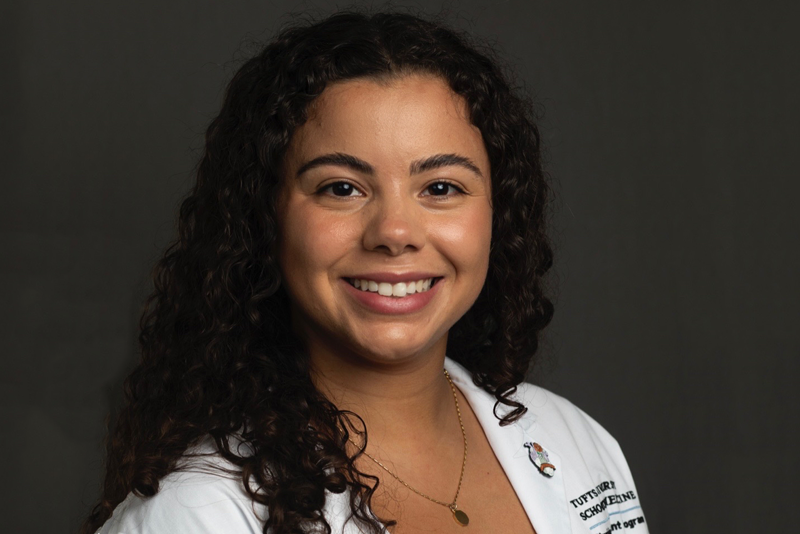-
About
- Departments & Offices
-
Academics
- Public Health
- Biomedical Sciences
- Physician Assistant
- Special Master’s (MBS)
-
Admissions & Financial Aid
- Tuition & Fees
-
Student Experience
-
- Student Resources by Program
- Academic & Student Support
- Wellness & Wellbeing
- Student Life
- Events & Traditions
-
-
Research
- Research Labs & Centers
- Tufts University-Tufts Medicine Research Enterprise
-
Local & Global Engagement
- Global Health Programs
- Community Engagement
Renata DeLury, PA24, MPH24
"I have a long list of things to be thankful for with regard to my education and training opportunities; being able to attend the Tufts PA program and also getting my MPH is at the top of that list."

Students in the Physician Assistant (PA) program at the Tufts University School of Medicine complete a rigorous curriculum in which the first year is dedicated almost exclusively to the foundations of medical science, pathophysiology of disease, and medical therapeutics, and the second year to full-time clinical rotations.
Even with a packed schedule, students like Renata DeLury, PA24, MPH24, still manage to go above and beyond during their time at Tufts. We sat down with DeLury, who was recently selected for the Physician Assistant Education Association (PAEA) Student Health Policy Fellowship and awarded the Physician Associate Foundation Scholarship, to hear more about these achievements and about her experience in the PA program at Tufts.
Why did you choose Tufts and to pursue the PA/MPH dual degree?
"I chose Tufts mostly for personal reasons. I went to undergrad at UMass Amherst, so most of my close friends moved to the Boston area post-grad. I wanted to be near my support system during PA school because I knew I would need it during the rigorous didactic and clinical years. I chose to pursue the PA/MPH dual degree because I believe it gives me a deeper understanding of what quality patient care is. Medical education is intense and can be very disease-focused as opposed to patient-focused, the MPH allowed me to spend an entire year with a patient-focus on health and the impacts of health systems that has shaped my approach to preventing and treating disease."
How has your experience been like so far at Tufts?
"My experience at Tufts has been overwhelmingly positive and enriching thus far. I've had opportunities to pursue projects I never knew I had interest in, I've met incredible mentors and clinicians who I want to model myself after, and I've made some wonderful friends who I am excited to stay connected with as we enter our careers. I have a long list of things to be thankful for with regard to my education and training opportunities; being able to attend the Tufts PA program and also getting my MPH is at the top of that list."
Why did you apply to the PAEA the fellowship, and what would you like to accomplish?
"I chose to apply because throughout my time at Tufts as an MPH student and a PA student I've learned that I want advocacy and policy change to be continuing aspects of my career. The opportunity to hone my skills as an advocate and learn more about the policy change process in the PA profession and for health care policy as a whole was incredibly appealing to me based on my career goals. Through the fellowship I was able to analyze current proposed policy changes and reach out to our Massachusetts state representative and congresswoman to advocate for the passage of two bills that would result in significant changes for PA students in the state. I hope to continue this work as I become a PA. As part of the project I must complete for the fellowship, it will ideally entail increasing awareness of PA advocacy work at Tufts and investigating what we as a PA program and an institution can do to improve PA student education, clinical training opportunities, and post-graduate involvement in PA and patient advocacy. "
What does receiving the PA Foundation scholarship mean to you?
"I chose to apply for the scholarship for the financial benefit but also because receiving an award for the work I'm doing as a PA student, and as a woman of color would serve as validation for my efforts and continued motivation that I'm doing what I am meant to do."
What do you hope to do accomplish after graduation?
"After graduating from Tufts, naturally, I want to find a job as a PA in Boston. I'm unsure of what specialty I want to work in, but I imagine that will become clearer as I complete my clinical rotations next year. I want to find a job that allows me to utilize my PA degree but also my MPH whether that be in formal research in improving patient care outcomes, or more informally as an advocate for my patients who can connect them with a variety of resources based on their specific needs. Something I also want to do after graduation is continue the volunteer work I've done with the Community Harvest Project and the Boston Area Gleaners. This work, consisting of gleaning different farms across Massachusetts and packaging produce for the Greater Boston Food Bank, has been the perfect way for me to connect my interests as a clinician with my interests as a public health professional. If I want my patients to practice healthy behaviors like eating balanced meals with lots of fresh produce, I have to do my part in increasing access to those food resources."
Learn More About the PA Program